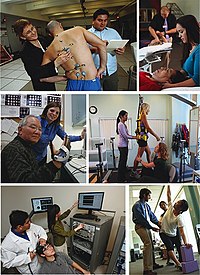
Photo from wikipedia
Background Decreasing the use of redundant anaerobic therapy is a key target for antimicrobial stewardship. Education techniques that optimize knowledge retention could be an important component of reducing these regimens.… Click to show full abstract
Background Decreasing the use of redundant anaerobic therapy is a key target for antimicrobial stewardship. Education techniques that optimize knowledge retention could be an important component of reducing these regimens. Methods We implemented a quality improvement project that incorporated spaced education to reduce the use of redundant anaerobic therapy. The initial interventions (November through December 2015) included education in a hospital-wide newsletter and review of redundant anaerobic regimens by the antimicrobial stewardship program. A spaced education module was then developed with the gastroenterology (GI) service, which had a relatively high rate of redundant anaerobic therapy use. Ten questions with teaching points were delivered to GI physicians at spaced intervals over 2 to 4 weeks (February through March 2016). Knowledge scores were compared at initial and final question presentation using generalized estimating equations. Interrupted time-series analysis was used to compare the rates of redundant-metronidazole-days per 1000 patient-days among patients in the patients admitted to the GI service and those in the non-GI group before and after the intervention. Results Of 66 GI physicians, 56 (85%) participated in the spaced education activity. After the intervention, their knowledge scores on all the questions improved, and their mean knowledge score increased from 57% to 86% (P < .001). Nearly all (91%) of the participants were very or generally satisfied with the activity. In the GI group, the rate of redundant-metronidazole-days decreased from 26.2 to 13.0 per 1000 patient-days (relative risk [RR], 0.45 [95% confidence interval (CI), 0.27-0.73]; P = .001). This rate in the non-GI group also decreased from 5.47 to 2.18 per 1000 patient-days (RR, 0.47 [95% CI, 0.36-0.60]; P < .001) after our interventions. Conclusions Spaced education is an effective approach for teaching antimicrobial stewardship topics. Focused provider education was associated with a sustained reduction in the use of redundant anaerobic therapy.
Journal Title: Journal of the Pediatric Infectious Diseases Society
Year Published: 2018
Link to full text (if available)
Share on Social Media: Sign Up to like & get
recommendations!